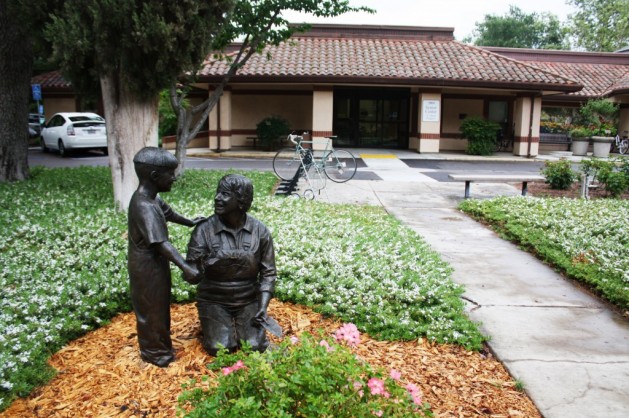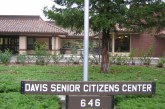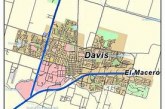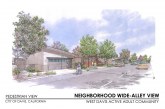 By E. Roberts Musser
By E. Roberts Musser
A controversial issue arose during the June 12, 2012 Davis Senior Citizens Commission meeting. Members of the 501(c)(3) non-profit Senior Citizens of Davis (SCD) came to the Commission, to voice their concerns about major proposed changes to the SCD bylaws approved by the SCD Board. In the current bylaws, SCD had as part of its mission, the requirement of mutual cooperation between SCD and the Davis Senior Center. However, the new proposed bylaws completely omit and do not mention the Davis Senior Center whatsoever.
Of particular concern is the clause about winding down the nonprofit corporation. The current bylaws require that upon dissolution, any remaining assets be used for the purposes of enhancing the programs for older adults offered through the Senior Center. Right now, approximately $560,000 is sitting in SCD accounts. Much of it was donated by a single benefactor, who assumed the terms of the current bylaws would continue to be controlling. The proposed bylaws will now allow any 501(c)(3) non-profit to be the beneficiary of an SCD dissolution – including a nonprofit any SCD Board member might decide to set up in the future.
The SCD Board President, John Gerlich, insisted the change was necessary, because he claimed the articles of incorporation are “in conflict” with the bylaws. Mr. Gerlich pointed out that the articles of incorporation make no mention of the Davis Senior Center – upon dissolution any remaining assets are to be given to any 501(c)(3) nonprofit. Therefore he wrongly concluded the current bylaws should not mention the Davis Senior Center either, if the articles of incorporation do not.
California Corporations Code Section 212(b) makes it clear: “The bylaws may contain any provision, not in conflict with law or the articles, for the management of the business and for the conduct of the affairs of the corporation…” The articles of incorporation state that any 501(c)(3) non-profit may be the residual beneficiary upon dissolution; the current bylaws make explicit the residual beneficiary’s purpose should be to benefit the Davis Senior Center. That is not necessarily a legal conflict within the meaning of Section 212(b).
Also of great concern in the proposed bylaws was the change in the principle place of business. It would no longer be at the Davis Senior Center, as in the current bylaws. At the commission meeting, Mr. Gerlich inexplicably referred to the possible future need of a branch office in south Davis. Nevertheless the proposed bylaws allow the location of the principal place of business to change from time to time, to be anywhere within the city or county, outside the purview of either the city or the Davis Senior Center.
Additionally, more power is vested in the Board President in particular, and away from SCD members in general, in the proposed bylaws. Independent financial oversight of investments by the Finance and Budget Director, in concert with the Treasurer, would be eliminated – the position of Finance and Budget Director no longer exists in the proposed bylaws. Donations and gifts would not be overseen and recorded by the Finance and Budget Director, the Senior Center Staff, and the Secretary as before. Financial statements would not have to be approved by the Board. Nor would expenditures above $500 have to be approved by the membership as previously required.
Instead, the Board President is given complete autonomy to preside over a newly created Financial Advisory Committee in the proposed bylaws. The Board President would also be given the additional powers to: act and speak for SCD between Board meetings; establish, amend or eliminate committees; amend the budget at any time; conduct closed session Board meetings for “sensitive” items; and manage the day-to-day operations of SCD. The Vice President would no longer be responsible for planning and scheduling programs for membership business or meetings – that authority would now reside with the President.
Under the proposed bylaws, the Board itself may: approve memberships; terminate membership of SCD members it deems have “prejudiced the purpose and interests of SCD”; convene and exercise powers even if a Board quorum is not present; adopt “special” rules other than Roberts Rules of Order; and adopt/amend/repeal bylaws by a majority vote of a Board quorum without any membership approval.
It should also be noted that SCD has had the free use of the Davis Senior Center facilities and equipment up until now. This is as a direct result of the symbiotic relationship that currently exists between this nonprofit and the city facility – they both have benefited each other. However, the city is likely to rethink its policies in light of any significant changes in the bylaws as suggested. If the Davis Senior Center does not receive sufficient benefit from SCD, then it has no reason to continue allowing SCD to use its facilities free of charge. And whether donors will continue to give to SCD in light of recent developments is open to question.
The vote on whether to approve the bylaws or not by the SCD membership is to occur 45 min. prior to a luau luncheon in August. When Mr. Gerlich was asked at the commission meeting if he thought this was an appropriate venue and sufficient time to decide such complex and weighty matters, his emphatic response was an insistent “yes”. It was suggested by Commissioners that he slow the process down, and take some time to address SCD members’ concerns. He did not seem particularly receptive to this idea.
It appears the final decision on the issue of approving the proposed SCD bylaws will be made just before the luau luncheon. SCD members were stalwartly advised by Commissioners to encourage fellow members to attend en masse, and voice their disapproval by a “no” vote. I personally warned SCD members of the dangers of consolidating more power in the President and Board by taking it away from members; removing financial oversight; and omitting any mention of the Davis Senior Center.
Unfortunately, having had a lot of experience with nonprofits as an attorney, I am acutely aware of the perils of amending existing bylaws. Especially if it is in such a way that gives the Board or its officers greater power and removes financial oversight. My hope is the Davis Senior Citizens Commission gave enough food for thought, that it will mobilize SCD members into action. Otherwise, I shudder to think of the possible consequences if these proposed bylaws are approved “as is”.
Lesson to be learned: If you belong to a nonprofit, pay attention to what is happening within the organization. If there is going to be a proposed change in bylaws, ask lots of questions. Make sure you understand why the changes are necessary, and what the possible repercussions will be of any such alternations in governing documents.
Elaine Roberts Musser is an attorney who concentrates her efforts on elder law and aging issues, especially in regard to consumer affairs. If you have a comment or particular question or topic you would like to see addressed in this column, please make your observations at the end of this article in the comment section.






Elaine
It is unclear to me what advantages Mr. Gerlich’s proposal would have for members of the SCD or what disadvantage there is to keeping the current bylaws. Can you further explain his reasoning ?
[quote]It is unclear to me what advantages Mr. Gerlich’s proposal would have for members of the SCD or what disadvantage there is to keeping the current bylaws. Can you further explain his reasoning ?[/quote]
Very astute question. There are no significant/substantive advantages that I can see for the membership in adopting these new bylaws “as is”. John Gerlich argued it was necessary because some terms of the bylaws are contrary to current state and federal law, which is true, e.g members must be 50 years and older is a requirement in the current bylaws that now constitutes age discrimination. This is not uncommon, for nonprofits incorporated long ago with articles of incorporation and bylaws that slowly evolve over time. However, any terms in the bylaws or articles of incorporation that are in conflict with state or federal law are unenforceable – state and federal law control. But such governing documents can easily be amended to simply fix any offending terms. So that does not explain the sweeping changes proposed, to push for the removal of financial oversight, omission of support for the Senior Center as part of the express mission/purpose of SCD, or consolidation of more power in the President and Board.
I would guess $560,000 has something to do with it.
The only thing worse than a nonprofit with no money, is a nonprofit with money.
ERM writes:
“Of particular concern is the clause about winding down the nonprofit corporation. The current bylaws require that upon dissolution, any remaining assets be used for the purposes of enhancing the programs for older adults offered through the Senior Center. Right now, approximately $560,000 is sitting in SCD accounts. Much of it was donated by a single benefactor, who assumed the terms of the current bylaws would continue to be controlling. The proposed bylaws will now allow any 501(c)(3) non-profit to be the beneficiary of an SCD dissolution – including a nonprofit any SCD Board member might decide to set up in the future.”
Dear Elaine, Twin Pines Cooperative Foundation has the same issue with the DACHA board illegally changing the Articles that permanently protected the assets for cooperative housing by removing Twin Pines Cooperative Foundation and replacing the language to make it the City.
However, in the case of the DACHA board, the articles were changed first by a board that was not legally entitled to be seated (If you were 30 days behind the bylaws required you had to be automatically removed from the board).
Then they were changed by a vote of the DACHA membership. However, there was not a legal quorum of the membership (if you were 30 days delinquent you could not vote).
Anyhow, they took the votes, and through our legal discovery, we found that they had signed under penalty of perjury that they had met the state requirements for a change in the Articles.
The President and Secretary of DACHA were both delinquent when the vote was taken.
The City staff and City Attorney prepared the changes for DACHA and showed DACHA how to do it.
I wonder if City staff had any role in the sitation you describe?
I am glad you are concerned about a nonprofit group improperly changing articles and bylaws that removes the initial entity and intent.
David Thompson, President, Twin Pines Cooperative Foundation
ERM
“So that does not explain the sweeping changes proposed, to push for the removal of financial oversight…”
Another similarity with DACHA. The board and members wanted TPCF and other sponsors and Neighbourhood Partners out of there so there would be no outside financial oversight.
When we were removed from advising DACHA the members owed less than $20,000 in rent delinquencies. Two years later rent delinquencies had shot up to over $60,000.
he DACHA Treasurer has been delinquent seven years without the City ever sending her any written warning. She still is today.
Financial oversight of nonprofits is a very critical factor. As ER suggests it should not be removed from the bylaws.
Sounds like the City should excercise some oversight over these actions.
David Thompson, Twin Pines Cooperative Foundation
[quote]Sounds like the City should excercise some oversight over these actions. [/quote]
I would argue the City should have exercised more oversight in the very beginning, and it would have avoided much of the difficulties later on…
Secondly, let’s see what the judge thinks about the DACHA issue…
I have removed three off-topic comments. David T.: the topic of this column is the Senior Citizens of Davis Bylaws.
I applaud ERMs efforts to stop the improper changes in removing The Davis Senior Center as the residual beneficiary.
California Corporations Code Section 212(b) makes it clear: “The bylaws may contain any provision, not in conflict with law or the articles, for the management of the business and for the conduct of the affairs of the corporation…” The articles of incorporation state that any 501(c)(3) non-profit may be the residual beneficiary upon dissolution; the current bylaws make explicit the residual beneficiary’s purpose should be to benefit the Davis Senior Center.
David Thompson, Twin Pines Cooperative Foundation
ERM is correct in in being concerned about the winding down of a nonprofit corporation. The law is quite clear about how this should be done. The change in bylaws anticipated is against the original intent and should be stopped.
“Of particular concern is the clause about winding down the nonprofit corporation. The current bylaws require that upon dissolution, any remaining assets be used for the purposes of enhancing the programs for older adults offered through the Senior Center. Right now, approximately $560,000 is sitting in SCD accounts. Much of it was donated by a single benefactor, who assumed the terms of the current bylaws would continue to be controlling. The proposed bylaws will now allow any 501(c)(3) non-profit to be the beneficiary of an SCD dissolution – including a nonprofit any SCD Board member might decide to set up in the future.”
David Thompson, Twin Pines Cooperative Foundation
ERM:
With $560,000 at stake who has the most to gain by these changes?
Given the City staff role in the Senior Center have they played a role in advising any of the parties?
David Thompson, Twin Pines Cooperative Foundation
ERM
“So that does not explain the sweeping changes proposed, to push for the removal of financial oversight,…”
One must always worry when “financial oversight” is either removed or transferred.
I would vote against these SCD changes at the meeting.
Best wishes in your efforts!
David Thompson, Twin Pines Cooperative Foundation
[quote]“The only thing worse than a nonprofit with no money, is a nonprofit with money.”[/quote]You’ve got it, Alan. Non-profits with money can do great things, but one or two aggressive folks with the time to devote can pretty much take over a volunteer organization. Devoted members can drop off out of frustration even when no money is at stake. But, when there is cash…. And, where there is big money….
Is John Gerlich misguided (in not bringing along or listening to his fellow organization members)? Or, is it being suggested he’s involved in some devious undertaking?
“Right now, approximately $560,000 is sitting in SCD accounts. Much of it was donated by a single benefactor, who assumed the terms of the current bylaws would continue to be controlling.”
If the benefactor is still alive then that person should speak up as to their intent. If not, then perhaps those who were around at that time should speak for what transpired and what was the intent.
If there are to be changes in the articles of incorporation then the state requires specific votes of both the board and membership.
I would suspect given my experience in this field that SCD as an organization might not legally meet the state requirements and therefore this action could not be achieved.
David Thompson, Twin Pines Cooperative Foundation
Since this topic was brought forward, any way to offer the President a chance to tell his side on the DV?
[quote]With $560,000 at stake who has the most to gain by these changes?
Given the City staff role in the Senior Center have they played a role in advising any of the parties? [/quote]
The people with the most to gain are the current SCD Board and especially the President, who will have almost complete autonomy over the assets/finances. The losers will be the SCD members, who will lost a lot of rights under the previous bylaws.
Some city staff are SCD members…
[quote]Is John Gerlich misguided (in not bringing along or listening to his fellow organization members)? Or, is it being suggested he’s involved in some devious undertaking?[/quote]
There are no particular motives ascribed to Mr. Gerlich. I don’t know him at all. The facts (what changes are being proposed) speak for themselves.
[quote]Since this topic was brought forward, any way to offer the President a chance to tell his side on the DV?[/quote]
Actually, the President offered a public statement at the Commission meeting. I can send it to dmg to post…